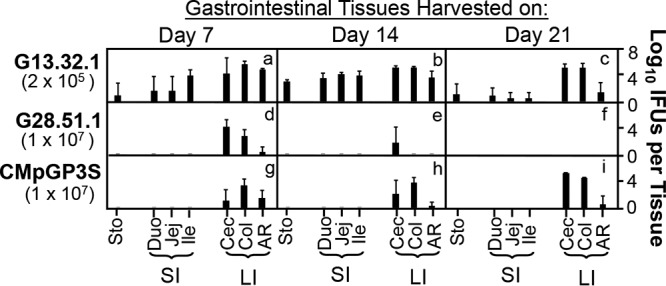FIG 3.

Comparison of C. muridarum with or without mutations in chromosomal genes tc0668 and tc0237 or plasmid gene pgp3 for survival in mouse gastrointestinal tissues following an intracolonic inoculation. Groups of C57BL/6J mice intracolonically infected with C. muridarum as described in the legend of Fig. 2 were sacrificed on days 7 (n = 5), 14 (n = 5), and 21 (n = 3 to 5) after the intracolonic inoculation for monitoring live chlamydial organisms in different segments of the gastrointestinal tract including stomach (Sto), small intestine (SI) tissues of the duodenum (Duo), jejunum (Jej), and ileum (Ile) and large intestine (LI) tissues of the cecum (Cec), colon (Col), and anorectum (AR) as indicated. Note that the chromosomal gene mutant G28.51.1 rapidly reduced its survival in the mouse colon by day 14 and completely cleared by day 21 while the plasmid gene mutant CMpGP3S was able to productively colonize the colon following an intracolonic inoculation. Thus, we designated G28.51.1 a colon colonization-deficient mutant. P < 0.05 (for results from colons of G28.51.1- versus CMpGP3S-infected mice in panel e versus panel h; Wilcoxon test).
